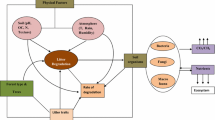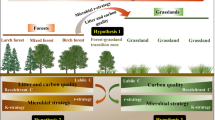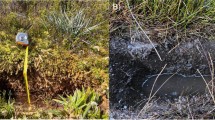Abstract
Litter decomposition is an ecosystem process that allows energy and nutrients transfer from dead plant matter into detrital food webs. Several studies revealed that leaf litter decomposition rates differ across biomes, but the reasons for these differences are not yet clear. Here, we test the role of several leaf litter physical and chemical characteristics as predictors of decomposition rates and whether life forms (evergreen vs. deciduous) differ in decomposition rates. Leaves from dominant riparian trees were collected in four ecoregions (temperate deciduous forest, subtropical seasonal semideciduous forest, tropical Cerrado and subtropical dense ombrophylous forest) and their physical and chemical characteristics were measured. We then determined leaf litter decomposition, colonization by aquatic hyphomycetes and macroinvertebrates in a same stream (i.e., under the same environmental conditions), and consumption rates by shredders under laboratory conditions. Deciduous and evergreen tree species did not differ in the measured litter characteristics, but deciduous leaves decompose faster than evergreens. Leaf litter from tree species from the four ecoregions differed in their physical and chemical characteristics. Litter from temperate deciduous species decomposed faster than litter from the other three ecoregions, generally supported higher aquatic hyphomycete species richness and sporulation rates and higher consumption rates by shredders. There were significant negative correlations between litter decomposition and associated biotic variables and litter initial lignin concentration and lignin:N ratio. We conclude that lignin concentration and lignin:N ratio are important predictors of litter decomposition, although other unmeasured parameters such as micronutrients may also play important roles in this key ecosystem process.





Similar content being viewed by others
References
Abelho M (2001) From litterfall to breakdown in streams: a review. The Sci World 1:656–680. https://doi.org/10.1100/tsw.2001.103
Abelho M, Graça MAS (1996) Effects of eucalyptus afforestation on leaf litter dynamics and macroinvertebrate community structure of streams in Central Portugal. Hydrobiologia 324:195–204
Albariño RJ, Balseiro EG (2001) Food quality, larval consumption, and growth of Klapopteryx kuscheli (Plecoptera: Austroperlidae) from a south Andes stream. J Freshw Ecol 16:517–526
Amani M, Graça MAS, Ferreira V (2019) Effects of elevated atmospheric CO2 concentration and temperature on litter decomposition in streams: a meta-analysis. Int Rev Hydrobiol 104:14–25. https://doi.org/10.1002/iroh.201801965
Bakker MA, Carreño-Rocabado G, Poorter L (2011) Leaf economics traits predict litter decomposition of tropical plants and differ among land use types. Funct Ecol 25:473–483. https://doi.org/10.1111/j.1365-2435.2010.01802.x
Balseiro E, Albariño R (2006) C-N mismatch in the leaf litter–shredder relationship of an Andean Patagonian stream detritivore. J N Am Benthol Soc 25:607–615
Bärlocher F, Gessner MO, Graça MAS (2020) Methods to study litter decomposition: a practical guide. Springer, Dordrecht
Biasi C, Graça MAS, Santos S, Ferreira V (2017) Nutrient enrichment in water more than in leaves affects aquatic microbial litter processing. Oecologia 184:555–568
Biasi C, Fontana LE, Restello RM, Hepp LU (2020) Effect of invasive Hovenia dulcis on microbial decomposition and diversity of hyphomycetes in Atlantic forest streams. Fungal Ecol 44:100890. https://doi.org/10.1016/j.funeco.2019.100890
Boyero L, Pearson RG, Dudgeon D, Graça MAS, Gessner MO, Albariño RJ, Ferreira V, Yule CM, Boulton AJ, Arunachalam M, Callisto M, Chauvet E, Ramírez A, Chará J, Moretti MS, Gonçalves JF, Helson JE, Chará-Serna AM, Encalada AC, Davies JN, Lamothe S, Cornejo A, Li AOY, Buria LM, Villanueva VD, Zúñiga MC, Pringle CM (2011a) Global distribution of a key trophic guild contrasts with common latitudinal diversity patterns. Ecology 92:1839–1848. https://doi.org/10.1890/10-2244.1
Boyero L, Pearson RG, Gessner MO, Barmuta LA, Ferreira V, Graça MAS, Dudgeon D, Boulton AJ, Callisto M, Chauvet E, Helson JE, Bruder A, Albariño RJ, Yule CM, Arunachalam M, Davies JN, Figueroa R, Flecker AS, Ramírez A, Death RG, Iwata T, Mathooko JM, Mathuriau C, Gonçalves JF, Moretti MS, Jinggut T, Lamothe S, M’Erimba C, Ratnarajah L, Schindler MH, Castela J, Buria LM, Cornejo A, Villanueva VD, West DC (2011b) A global experiment suggests climate warming will not accelerate litter decomposition in streams but might reduce carbon sequestration. Ecol Lett 14:289–294. https://doi.org/10.1111/j.1461-0248.2010.01578.x
Boyero L, Pearson RG, Hui C, Gessner MO, Pérez J, Alexandrou MA, Graça MAS, Cardinale BJ, Albariño RJ, Arunachalam M, Barmuta LA, Boulton AJ, Bruder A, Callisto M, Chauvet E, Death RG, Dudgeon D, Encalada AC, Ferreira V, Figueroa R, Flecker AS, Gonçalves JF Jr, Helson J, Iwata T, Jinggut T, Mathooko J, Mathuriau C, M’Erimba C, Moretti MS, Pringle CM, Ramirez A, Ratnarajah L, Rincon J, Yule CM (2016) Biotic and abiotic variables influencing plant litter breakdown in streams: a global study. Proc R Soc B-Biol Sci 283:20152664. https://doi.org/10.1098/rspb.2015.2664
Boyero L, Graça MAS, Tonin AM, Pérez J, Swafford AJ, Ferreira V, Landeira-Dabarca A, Alexandrou M, Gessner MO, McKie BG, Albariño RJ, Barmuta LA, Callisto M, Chará J, Chauvet E, Colón-Gaud C, Dudgeon D, Encalada AC, Figueroa R, Flecker AS, Fleituch T, Frainer A, Gonçalves JF, Helson JE, Iwata T, Mathooko J, M’Erimba C, Pringle CM, Ramírez A, Swan CM, Yule CM, Pearson RG (2017) Riparian plant litter quality increases with latitude. Sci Rep 7:10562. https://doi.org/10.1038/s41598-017-10640-3
Callisto M, Gonçalves JF Jr, Graça MAS (2007) Leaf litter as a possible food source for chironomids (Diptera) in Brazilian and Portuguese headwater streams. Revista Brasileira De Zoologia 24:442–448. https://doi.org/10.1590/S0101-81752007000200023
Canhoto C, Graça MAS (1999) Leaf barriers to fungal colonization and shredders (Tipula lateralis) consumption of decomposing Eucalyptus globulus. Microb Ecol 37:163–172. https://doi.org/10.1007/s002489900140
Coley PD, Barone JA (1996) Herbivory and plant defenses in tropical forests. Ann Rev Ecol Syst 27:305–335
Cornelissen JHC, Diez PC, Hunt R (1996) Seedling growth, allocation and leaf attributes in a wide range of woody plant species and types. J Ecol 84:755–765
Cornelissen JHC, Perez-Harguindeguy N, Diaz S, Grime JP, Marzano B, Cabido M, Vendramini F, Cerabolini B (1999) Leaf structure and defence control litter decomposition rate across species and life forms in regional floras on two continents. New Phytol 143:191–200. https://doi.org/10.1046/j.1469-8137.1999.00430.x
Cornut J, Elger A, Lambrigot D, Marmonier P, Chauvet E (2010) Early stages of leaf decomposition are mediated by aquatic fungi in the hyporheic zone of woodland streams. Freshw Biol 55:2541–2556. https://doi.org/10.1111/j.1365-2427.2010.02483.x
Cornwell WK, Cornelissen HC, Dorrepaal E, Eviner VT, Godoy O, Hobbie SE, Hoorens B, van Bodegom P (2008) Plant species traits are the predominant control on litter decomposition rates within biomes worldwide. Ecol Lett 11:1065–1071. https://doi.org/10.1111/j.1461-0248.2008.01219.x
Cross WF, Benstead JP, Rosemond AD, Wallace JB (2003) Consumer-resource stoichiometry in detritu-based streams. Ecol Lett 6:721–732
Danger M, Gessner MO, Barlocher F (2016) Ecological stoichiometry of aquatic fungi: current knowledge and perspectives. Fungal Ecol 19:100–111
Duarte S, Bärlocher F, Pascoal C, Cássio F (2016) Biogeography of aquatic hyphomycetes: Current knowledge and future perspectives. Fungal Ecol 19:169–181. https://doi.org/10.1016/j.funeco.2015.06.002
Fenoy E, Casas JJ, Díaz-Lopez M, Rubio JJ, Guil-Guerrero L, Moyano-Lopéz FJ (2016) Temperature and substrate chemistry as major drivers of interregional variability of leaf microbial decomposition and cellulolytic activity in headwater streams. FEMS Microbiol Ecol 92:2016. https://doi.org/10.1093/femsec/fiw169
Ferreira V, Castagneyrol B, Koricheva J, Gulis V, Chauvet E, Graça MAS (2015) A meta-analysis of the effects of nutrient enrichment on litter decomposition in streams. Biol Rev 90:669–688. https://doi.org/10.1111/brv.12125
Ferreira V, Castela J, Rosa P, Tonin AM, Boyero L, Graça MAS (2016a) Aquatic hyphomycetes, benthic macroinvertebrates and leaf litter decomposition in streams naturally differing in riparian vegetation. Aquat Ecol 50:711–725. https://doi.org/10.1007/s10452-016-9588-x
Ferreira V, Raposeiro PM, Pereira A, Cruz AM, Costa AC, Graça MAS, Gonçalves V (2016b) Leaf litter decomposition in remote oceanic island streams is driven by microbes and depends on litter quality and environmental conditions. Freshw Biol 61:783–799. https://doi.org/10.1111/fwb.12749
Flores L, Larrañaga A, Elosegi A (2014) Compensatory feeding of a stream detritivore alleviates the effects of poor food quality when enough food is supplied. Freshw Sci 33:134–141. https://doi.org/10.1086/674578
Follstad Shah JJ, Kominoski JS, Ardón M, Dodds WK, Gessner MO, Griffiths NA, Hawkins CP, Johnson SL, Lecerf A, LeRoy CJ, Manning DWP, Rosemond AD, Sinsabaugh RL, Swan CM, Webster JR, Zeglin LH (2017) Global synthesis of the temperature sensitivity of leaf litter breakdown in streams and rivers. Glob Change Biol 23:3064–3075. https://doi.org/10.1111/gcb.13609
Foucreau CP, Puijalon S, Hervant F (2013) Effect of climate-related change in vegetation on leaflitter consumption and energy storage by Gammarus pulex from continental or Mediterranean populations. PLoS ONE 8:e77242. https://doi.org/10.1371/journal.pone.0077242
Frainer A, Moretti MS, Wenjing X, Gessner MO (2015) No evidence for leaf-trait dissimilarity effects on litter decomposition, fungal decomposers, and nutrient dynamics. Ecology 96:550–561. https://doi.org/10.1890/14-1151.1
Fugère V, Lostchuck E, Chapman LJ (2020) Litter decomposition in Afrotropical streams: effects of land use, home-field advantage, and terrestrial herbivory. Freshw Sci 39(3):497–507. https://doi.org/10.1086/709807
García-Palacios P, Mckie BG, Handa IT, Frainer A, Hättenschwiler S (2016) The importance of litter traits and decomposers for litter decomposition: a comparison of aquatic and terrestrial ecosystems within and across biomes. Funct Ecol 30:819–829. https://doi.org/10.1111/1365-2435.12589
Gessner MO, Chauvet E (1994) Importance of stream microfungi in controlling breakdown rates of leaf litter. Ecology 75:1807–1817. https://doi.org/10.2307/1939639
Gessner MO, Swan CM, Dang CK, McKie BG, Bardgett RD, Wall DH, Hättenschwiler S (2010) Diversity meets decomposition. Trends Ecol Evol 25:372–380. https://doi.org/10.1016/j.tree.2010.01.010
Godoy O, Castro-Diez P, van Logtestijn RSP, Cornelissen JHC, Valladares F (2010) Leaf litter traits of invasive species slow down decomposition compared to Spanish natives: a broad phylogenetic comparison. Oecologia 162:781–790. https://doi.org/10.1007/s00442-009-1512-9
Goering HK, van Soest PJ (1970) Forage fiber analysis (apparatus, reagents, procedures and some applications). Agricultural handbook, USA
Gomes PP, Medeiros AO, Gonçalves JFG (2016) The replacement of native plants by exotic species may affect the colonization and reproduction of aquatic hyphomycetes. Limnologica 59:124–130. https://doi.org/10.1016/j.limno.2016.05.005
Gonçalves JF Jr, Graça MAS, Callisto M (2006) Leaf-litter breakdown in 3 streams in temperate, Mediterranean, and tropical Cerrado climates. J N Am Benthol Soc 25:344–355. https://doi.org/10.1899/08873593(2006)25[344:LBISIT]2.0.CO;2
Gonçalves JF Jr, Graça MAS, Callisto M (2007) Litter decomposition in a Cerrado savannah stream is retarded by leaf toughness, low dissolved nutrients and a low density of shredders. Freshw Biol 52:1440–1451. https://doi.org/10.1111/j.1365-2427.2007.01769.x
González JM, Graça MAS (2003) Conversion of leaf litter to secondary production by a shredding caddis-fly. Freshw Biol 48:1578–1592
Graça MAS, Cressa C (2010) Leaf quality of some tropical and temperate tree species as food resource for stream shredders. Int Rev Hydrobiol 95:27–41. https://doi.org/10.1002/iroh.200911173
Graça MAS, Ferreira V, Canhoto C, Encalada AC, Guerrero-Bolaño F, Wantzen KM, Boyero L (2015) A conceptual model of litter breakdown in low order streams. Int Rev Hydrobiol 100:1–12. https://doi.org/10.1002/iroh.201401757
Greenwood JL, Rosemond AD, Wallace JB, Cross WF, Weyers HS (2007) Nutrients stimulate leaf breakdown rates and detritivore biomass: bottom-up effects via heterotrophic pathways. Oecologia 151:637–649. https://doi.org/10.1007/s00442-006-0609-7
Grime JP, Cornelissen HC, Thompson K, Hodgson JG (1996) Evidence of a causal connection between anti-herbivore defence and the decomposition rate of leaves. Oikos 77:489–494. https://doi.org/10.2307/3545938
Gulis V, Suberkropp K (2003) Leaf litter decomposition and microbial activity in nutrient-enriched and unaltered reaches of a headwater stream. Freshw Biol 48:123–134
Gulis V, Ferreira V, Graça MAS (2006) Stimulation of leaf litter decomposition and associated fungi and invertebrates by moderate eutrophication: Implications for stream assessment. Freshw Biol 51:1655–1669. https://doi.org/10.1111/j.1365-2427.2006.01615.x
Hieber M, Gessner MO (2002) Contribution of stream detrivores, fungi, and bacteria to leaf breakdown based on biomass estimates. Ecology 83:1026–1038. https://doi.org/10.1890/0012-9658(2002)083[1026:COSDFA]2.0.CO;2
Hill RW, Wyse GA, Anderson M (2004) Animal Physiology. Sinauer Associates, Inc. Publishers, Sunderland
Hladyz S, Gessner MO, Giller PS, Pozo J, Woodward G (2009) Resource quality and stoichiometric constraints on stream ecosystem functioning. Freshw Biol 54:957–970
Hladyz S, Kajsa A, Giller PS, Woodward G (2011) Impacts of an aggressive riparian invader on community structure and ecosystem functioning in stream food webs. J Appl Ecol 48:443–452
Hunt HW, Ingham ER, Coleman DC, Elliott ET, Reid CPP (1988) Nitrogen limitation of production and decomposition in prairie, mountain meadow, and pine forest. Ecology 69:1009–1016. https://doi.org/10.2307/1941256
INMET Instituto Nacional de Meteorologia do Brasil. http://www.inmet.gov.br. Accessed Mar 2019
IPMA: Instituto Português do Mar e da Atmosfera. http://www.ipma.pt/. Accessed Mar 2019
Jabiol J, Lecerf A, Lamothe S, Gessner MO, Chauvet E (2019) Litter quality modulates effects of dissolved nitrogen on leaf decomposition by stream microbial communities. Microb Ecol 77:959–966. https://doi.org/10.1007/s00248-019-01353-3
Kennedy KTM, El-sabaawi RW (2017) A global meta-analysis of exotic versus native leaf decay in stream ecosystems. Freshw Biol 62:977–989. https://doi.org/10.1111/fwb.12918
Lecerf A, Chauvet E (2008) Intraspecific variability in leaf traits strongly affects alder leaf decomposition in a stream. Basic Appl Ecol 9:598–605. https://doi.org/10.1016/j.baae.2007.11.003
Li Q, Zhang MH, Geng QH, Jin CS, Zhu JY, Ruan HH, Xu X (2020) The roles of initial litter traits in regulating litter decomposition: a “common plot” experiment in a subtropical evergreen broadleaf forest. Plant Soil 452:207–216. https://doi.org/10.1007/s11104-020-04563-8
Lin D, Wang F, Fanin N, Pang M, Dou P, Wang H, Qian S, Zhao L, Yang Y, Mi X, Ma K (2019) Soil fauna promote litter decomposition but do not alter the relationship between leaf economics spectrum and litter decomposability. Soil Biol Biochem 136:107519. https://doi.org/10.1016/j.soilbio.2019.107519
Liu GD, Sun JF, Tian K, Xiao DR, Yuan XZ (2017) Long-term responses of leaf litter decomposition to temperature, litter quality and litter mixing in plateau wetlands. Freshw Biol 62:178–190. https://doi.org/10.1111/fwb.12860
Makkonen M, Matty P, Handa IT (2012) Highly consistent effects of plant litter identity and functional traits on decomposition across a latitudinal gradient. Ecol Lett 15:1033–1041. https://doi.org/10.1111/j.1461-0248.2012.01826.x
Maller A, da Silva TM, Damasio ARD, Hirata IY, Jorge JA, Terenzi HF, Polizeli M (2013) Functional properties of a manganese-activated exo-polygalacturonase produced by a thermotolerant fungus Aspergillus niveus. Folia Microbiol 58:615–621. https://doi.org/10.1007/s12223-013-0249-3
Miatto RC, Batalha MA (2016) Leaf chemistry of woody species in the Brazilian cerrado and seasonal forest: response to soil and taxonomy and effects on decomposition rates. Plant Ecol 217:1467–1479. https://doi.org/10.1007/s11258-016-0658-x
Motomori K, Mitsuhashi H, Nakano S (2001) Influence of leaf litter quality on the colonization and consumption of stream invertebrate shredders. Ecol Res 16:173–182. https://doi.org/10.1046/j.1440-1703.2001.00384.x
Ordoñez JC, Bodegom PMV, Witte JM, Wright IJ, Reich PB, Aerts R (2008) A global study of relationships between leaf traits, climate and soil measures of nutrient fertility. Glob Ecol Biogeogr 18:137–149. https://doi.org/10.1111/j.1466-8238.2008.00441.x
Ostrofsky ML (1997) Relationship between chemical characteristics of autumn-shed leaves and aquatic processing rates. J N Am Benthol Soc 16:750–759. https://doi.org/10.2307/1468168
Perez-Harguindeguy N, Diaz S, Cornelissen JHC, Vendramini F, Cabido M, Castellanos A (2000) Chemistry and toughness predict leaf litter decomposition rates over a wide spectrum of functional types and taxa in central Argentina. Plant Soil 218:21–30. https://doi.org/10.1023/A:1014981715532
Rosemond AD, Benstead JP, Bumpers PM, Gulis V, Kominoski JS, Manning DWP, Suberkropp K, Wallace JB (2015) Experimental nutrient additions accelerate terrestrial carbon loss from stream ecosystems. Science 347:1142–1145
Ruggiero PGC, Batalha MA, Pivello VR, Meirelles ST (2002) Soil-vegetation relationships in cerrado (Brazilian savanna) and semideciduous forest, Southeastern Brazil. Plant Ecol 160:1–16
Schindler MH, Gessner MO (2009) Functional leaf traits and biodiversity effects on litter decomposition in a stream. Ecology 90:1641–1649
Silva DM, Batalha MA (2011a) Defense syndromes against herbivory in a cerrado plant community. Plant Ecol 212:181–193. https://doi.org/10.1007/s11258-010-9813-y
Silva IA, Batalha MA (2011b) Plant functional types in Brazilian savannas: the niche partitioning between herbaceous and woody species. Perspect Plant Ecol Evol Syst 13:201–206. https://doi.org/10.1016/j.ppees.2011.05.006
Strickland MS, Osburn E, Lauber C, Fierer N, Bradford MA (2009) Litter quality is in the eye of the beholder: initial decomposition rates as a function of inoculum characteristics. Funct Ecol 23:627–636. https://doi.org/10.1111/j.1365-2435.2008.01515.x
Vivanco L, Austin AT (2019) The importance of macro- and micro-nutrients over climate for leaf litter decomposition and nutrient release in Patagonian temperate forests. For Ecol Manag 441:144–154. https://doi.org/10.1016/j.foreco.2019.03.019
Wallace JB, Eggert SL, Meyer JL, Webster JR (1997) Multiple trophic levels of a forest stream linked to terrestrial litter inputs. Science 277:102–104. https://doi.org/10.1126/science.277.5322.102
Woodward G, Gessner MO, Giller PS, Gulis V, Hladyz S, Lecerf A, Malmqvist B, Mckie BG, Tiegs SD, Cariss H, Dobson M, Elosegi A, Ferreira V, Graça MAS, Fleituch T, Lacoursière JO, Nistorescu M, Pozo J, Risnoveanu G, Schindler M, Vadineanu A, Vought LB-M, Chauvet E (2012) Continental-scale effects of nutrient pollution on stream ecosystem functioning. Science 336:1438–1440. https://doi.org/10.1126/science.1219534
Wright IJ, Reich PB, Westoby M, Ackerly DD, Baruch Z, Bongers F, Cavender-Bares J, Chapin T, Cornelissen JHC, Diemer M, Flexas J, Garnier E, Groom PK, Gulias J, Hikosaka K, Lamont BB, Lee T, Lee W, Lusk C, Midgley JJ, Navas ML, Niinemets U, Oleksyn J, Osada N, Poorter H, Poot P, Prior L, Pyankov VI, Roumet C, Thomas SC, Tjoelker MG, Veneklaas EJ, Villar R (2004) The worldwide leaf economics spectrum. Nature 428:821–827. https://doi.org/10.1038/nature02403
Yeung AC, Kreutzweiser DP, Richardson JS (2019) Stronger effects of litter origin on the processing of conifer than broadleaf leaves: a test of home-field advantage of stream litter breakdown. Freshw Biol 64:1755–1768. https://doi.org/10.1111/fwb.13367
Yue K, García-Palacios P, Parsons SA, Yang W, Tan B, Huang C, Wu F (2018) Assessing the temporal dynamics of aquatic and terrestrial litter decomposition in an alpine forest. Funct Ecol 32:2464–2475. https://doi.org/10.1111/1365-2435.13143
Yue K, Ni XY, Fornara DA, Peng Y, Liao S, Tan SY, Wang DY, Wu FZ, Yang YS (2020) Dynamics of calcium, magnesium, and manganese during litter decomposition in Alpine forest aquatic and terrestrial ecosystems. Ecosystems. https://doi.org/10.1007/s10021-020-00532-5
Zhang M, Xu X (2019) Leaf litter traits predominantly control litter decomposition in streams worldwide. Glob Ecol Biogeogr 28:1469–1486. https://doi.org/10.1111/geb.12966
Zhang D, Hui D, Luo Y, Zhou G (2008) Rates of litter decomposition in terrestrial ecosystems: global patterns and controlling factors. J Plant Ecol 1:85–93. https://doi.org/10.1093/jpe/rtn002
Acknowledgements
This study was financed by the Portuguese Foundation for Science and Technology (FCT), through the strategic project UIDP/04292/2020 granted to MARE and through financial support given to VF (IF/00129/2014; CEECIND/02484/2018). The authors thank Dr. Marcos González, University of Santiago de Compostela, Spain, for the caddisfly identification; researchers from the Botanical Museum of Curitiba, Paraná, Brazil, for the identification of tree species; researchers from the Environmental Institute of Paraná, Brazil, for the collection of leaves in the semideciduous forest; researchers from the Laboratory of Limnology, Department of Ecology, Institute of Biological Sciences, University of Brasília for the collection of leaves in the Cerrado; and Aurea Lemes for helping in the field. Comments by two anonymous reviewers were greatly appreciated.
Author information
Authors and Affiliations
Corresponding author
Additional information
Handling Editor: Télesphore Sime-Ngando.
Publisher's Note
Springer Nature remains neutral with regard to jurisdictional claims in published maps and institutional affiliations.
Supplementary Information
Below is the link to the electronic supplementary material.
Rights and permissions
About this article
Cite this article
Ramos, S.M., Graça, M.A.S. & Ferreira, V. A comparison of decomposition rates and biological colonization of leaf litter from tropical and temperate origins. Aquat Ecol 55, 925–940 (2021). https://doi.org/10.1007/s10452-021-09872-3
Received:
Accepted:
Published:
Issue Date:
DOI: https://doi.org/10.1007/s10452-021-09872-3




